How to choose a probiotic
When it comes to preventing and treating conditions that are more prevalent in women—including mastitis, urinary tract infections, and yeast infections—you don’t have to (and shouldn’t!) rely on the same probiotic someone else in your family takes for digestive health.
When choosing a probiotic, it’s best to keep a few things in mind:
- Your age (is a probiotic best for an adult or child?)
- Your health problem or issue
- Whether a probiotic has been shown to help that health problem or issue
- The product’s quality and formulation
“Specific to women, some strains of Lactobacillus have been shown to help prevent and treat bacterial vaginosis and vulvovaginal candidiasis,” says Hannah Holscher, PhD, a registered dietitian and director of the University of Illinois Nutrition and Human Microbiome Laboratory in Urbana, Illinois.
Each strain has different probiotic health benefits, “and it’s important to select one that has been studied in the same reference population. For example, an adult woman may not see the same health benefits of a probiotic strain that was shown to improve a health outcome in infants.”
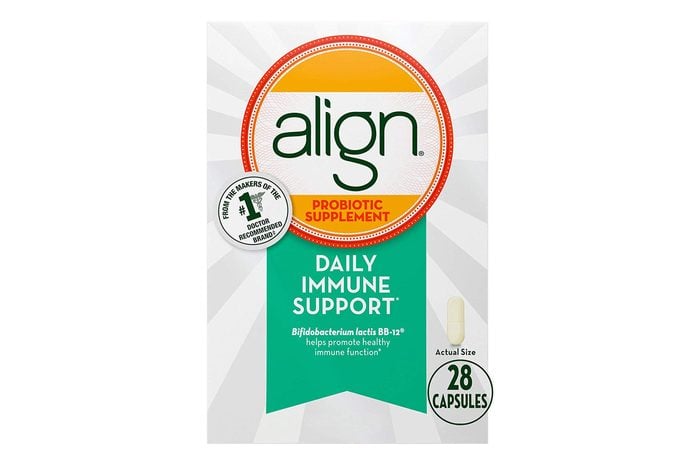
Best probiotic for immune health: Align Daily Immune Support
“Bifidobacterium is a type of probiotic well known for its antibacterial abilities and vaginal health help,” says Kristin Gustashaw, RDN, an instructor of clinical nutrition at Rush University in Chicago. “Like Lactobacillus, it helps boost your immune system. It also improves the absorption of iron, calcium, magnesium, and zinc. Align is a good supplement that contains Bifidobacterium.” As an added bonus, it may even enhance your mood: Bifidobacterium makes the list of the best supplements for depression.
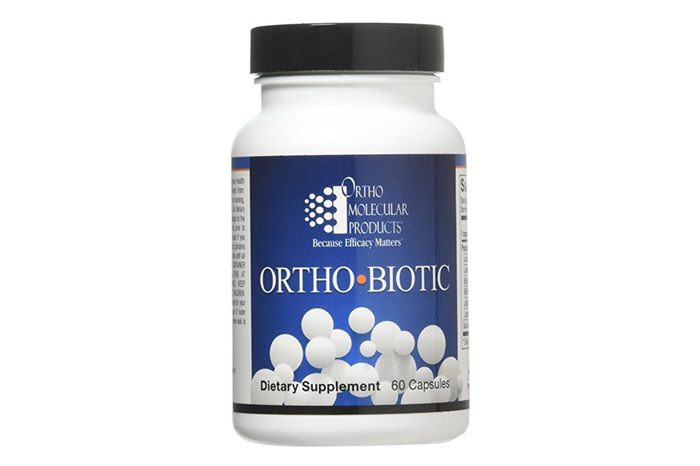
Best probiotic for period cramps: Ortho Molecular Products Ortho Biotic
This probiotic doesn’t contain any bacteria that produce histamine, a substance linked to inflammation, according to Nour Zibdeh, RDN, an integrative and functional dietitian in Washington, DC. “Histamine intolerance is more common in women because of estrogen. The higher your estrogen level, the more histamine your body will produce. Symptoms of histamine intolerance include headaches, itchy and red skin, anxiety, congestion, post-nasal drip, stomach pain, diarrhea, and period cramps. If these symptoms are worse at ovulation or right before your period, I suspect histamine intolerance and recommend a probiotic that will help break histamine down.” Dr. Zibdeh recommends this brand. “It’s a mix of strains that are either neutral or may help metabolize excess histamine,” she explains.
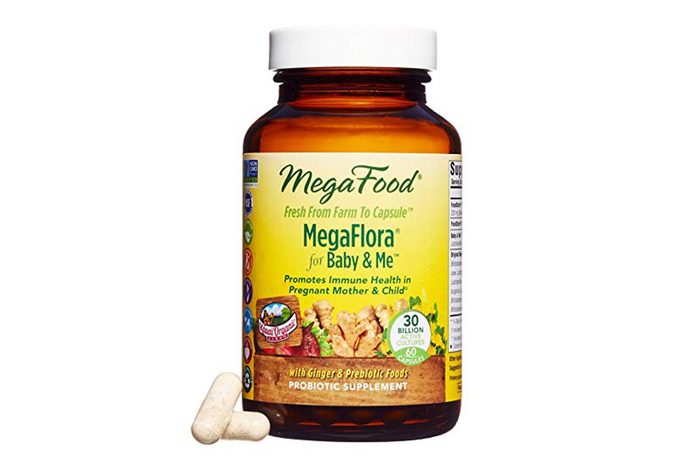
Best probiotic for pregnancy: MegaFood MegaFlora for Baby & Me
“Aside from the beneficial probiotics, this has plant-based compounds like ginger to soothe upset stomachs and support healthy digestive function,” says Beth Warren, RDN, a dietitian in Brooklyn, New York. It also has prebiotics, which encourage the growth of healthy bacteria that support the well being of pregnant and breastfeeding women, she explains. “The formula has L. rhamnosus HN001, which has been shown to support the child’s developing immune system during the last trimester and early breastfeeding period.”
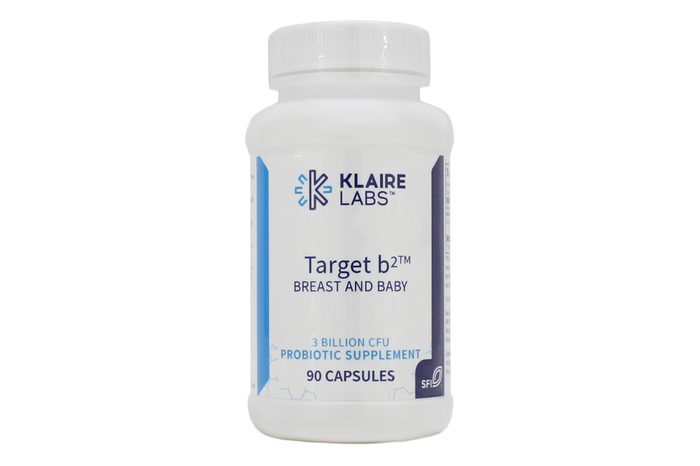
Best probiotic for breastfeeding: Klaire Labs Target B2
“This supplement contains the probiotic L. fermentum, which has been shown in a small handful of studies to reduce symptoms of mastitis,” says Lauren Manaker, RDN, a dietitian in Charleston, South Carolina. “One study suggests that the use of this probiotic is more effective than antibiotic therapy.” That explains why it’s one of the best probiotics for women suffering from mastitis—inflammation or infection caused by a blocked milk duct.
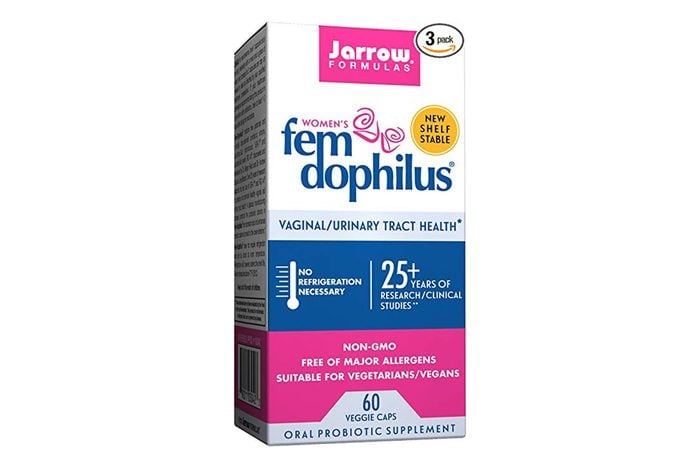
Best probiotic or vaginal health: Jarrow Formulas Fem Dophilus
Probiotics can help protect against common gynecological conditions such as bacterial vaginosis, candidiasis, and urinary tract infections, says Jennifer McDaniel, RDN, a dietitian in St. Louis. “Bacteria can pass through our digestive system into the vagina, so we have the opportunity to consume probiotics that can benefit our vaginal health. L. rhamnosus GR-1 and L. reuteri RC-14 are evidenced-based probiotic strains for women’s urogenital health. Not only do they disrupt the infection of a range of unhealthy bacteria and yeast in the vagina, they offer benefits to the vagina and reduce the risk of problems such as bladder infections.” Fem Dophilus, made by Jarrow Formulas, has the critical strains and the company adheres to the highest production standards, she says.
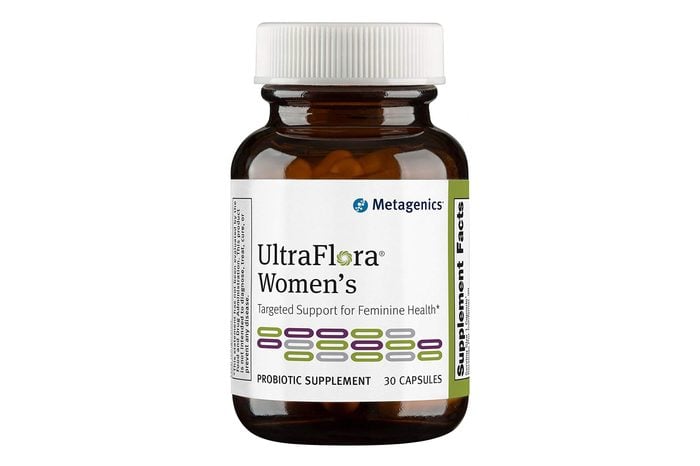
Best probiotic for vaginal health: Metagenics UltraFlora Women’s
“I recommend this to my patients because Metagenics provides high-quality, professional-grade supplements that are scientifically formulated,” says Crystal Karges, RDN, a maternal health dietitian in San Diego. “Supplementing with the specific probiotic strains in this product can help maintain healthy vaginal microflora and support urogenital health. Recent research has found that consuming probiotics during pregnancy may reduce the chances of premature birth and preeclampsia in late pregnancy.”
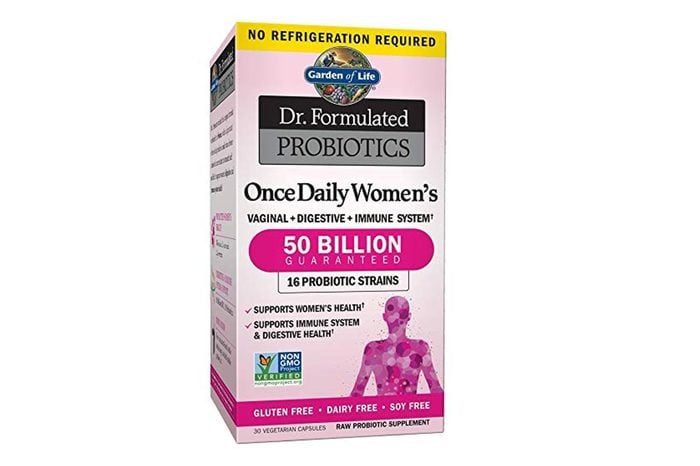
Best probiotic for vaginal health: Garden of Life Dr. Formulated Probiotics
“It is quite difficult to choose a solid top pick for probiotics because different strains have been shown to help different clinical issues,” says Rachel Fine, RD, a dietitian in New York City. “However, this supplement is a great option, with 50 billion strains,” that support vaginal, digestive, and immune system health, she says. “It is best to choose a product that is well within its expiration date to ensure a higher number of viable cells.” Learn more ways to make vitamins and supplements more effective.
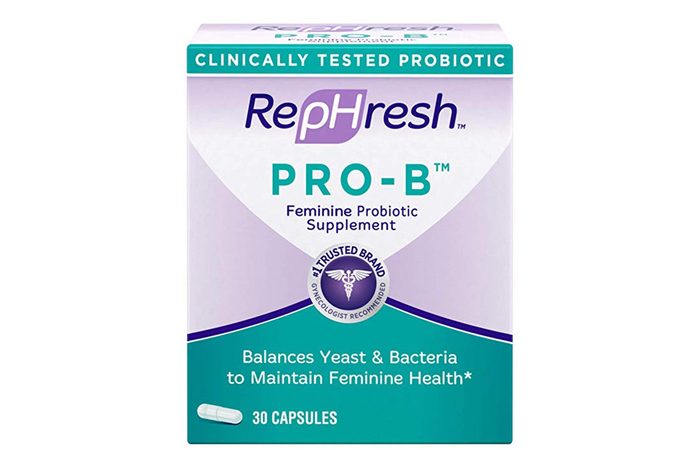
Best probiotic for vaginal health: RepHresh Pro-B
“There are numbers of papers that do show that certain strains of probiotics, particularly the L. rhamnosus strain contained in Pro-B, can help in prevention and treatment of vaginal bacterial and yeast infections,” says Mary Jane Minkin, MD, a clinical professor of ob-gyn at Yale University School of Medicine in New Haven, Connecticut. “And of course, many women have to take antibiotics intermittently, which can incidentally disturb their normal vaginal flora. This probiotic can be helpful for women to maintain healthy vaginal flora.” Taking antibiotics isn’t the only way to knock vaginal flora out of whack—read up on these 15 everyday situations that can mess with your vagina.
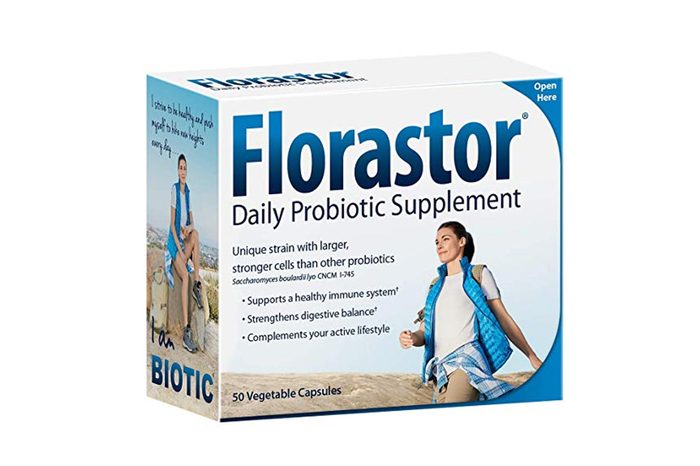
Best probiotic when taking antibiotics: Florastor Daily Probiotic Supplement
“Clients with tummy troubles, especially diarrhea, gas, and bloating have good success with Florastor,” says Cheryl Harris, RD, a dietitian in Fairfax, Virginia. “It contains Saccharomyces boulardii, a special strain of probiotic yeast. Most probiotics are killed by antibiotics, but because Florastor is a probiotic yeast that encourages healthy bacteria, it’s an ideal one to take along with antibiotics.” Find out more about why and how to take probiotics when you take antibiotics.
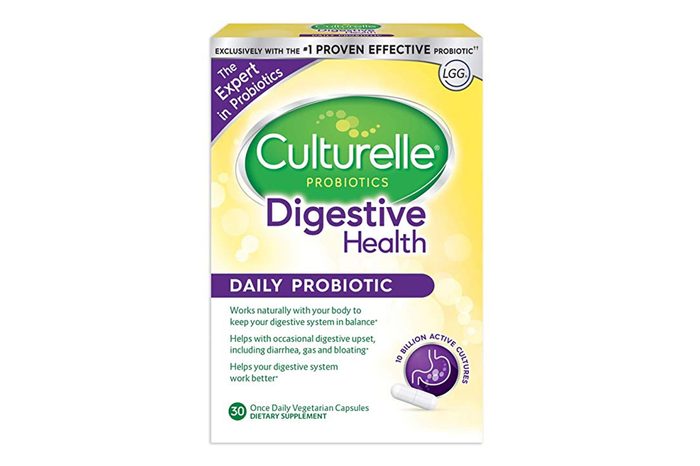
Best probiotic for digestive health: Culturelle Daily Probiotic
“Each capsule has 10 billion active cultures of L. GG, a probiotic that helps curb gas, bloating, and upset stomach,” says Niket Sonpal, MD, a gastroenterologist and adjunct professor of clinical medicine at Touro College of Osteopathic Medicine, in New York City. “The supplement also works to boost your immune system. Each capsule has the probiotic equivalent of 10 cups of yogurt and is dairy free.”
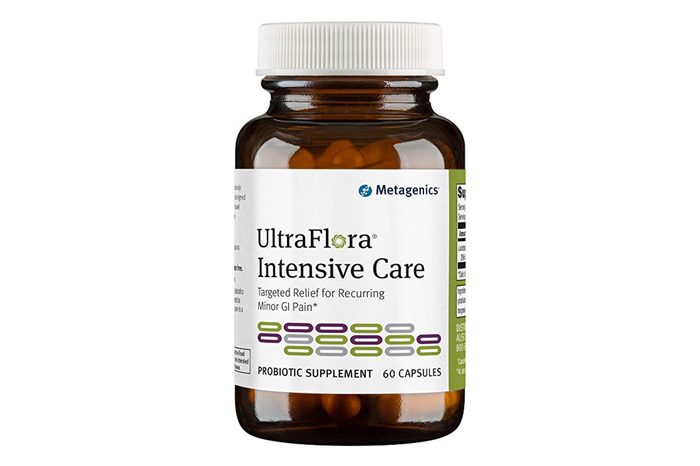
Best probiotic for gastrointestinal issues: Metagenics UltraFlora Intensive Care
“This product contains L. plantarum 299v, which has been found to be effective in treating irritable bowel syndrome (IBS), a condition millions of women suffer from,” says Ryan Whitcomb, RD, a dietitian in Jersey City, New Jersey. “This strain helps reduce abdominal pain, bloating, the feeling of incomplete evacuation, and stool frequency.” In addition to taking a probiotic, it’s also smart to avoid these 10 foods that can make IBS worse.
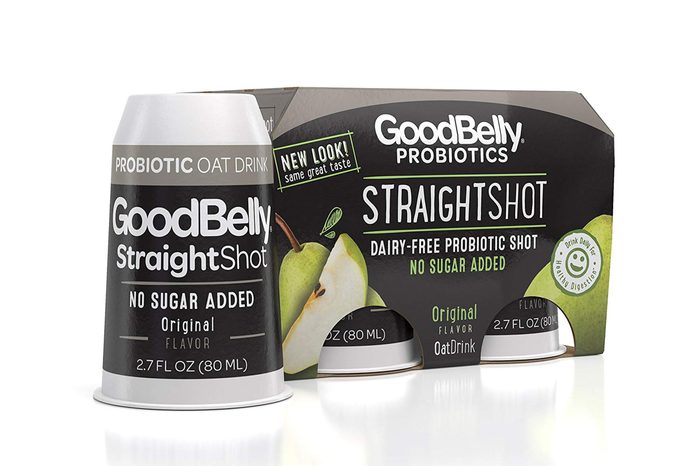
Best probiotic for gastrointestinal issues: GoodBelly Probiotic Straight Shot
“The bacterial strain L. plantarum 299v, found in GoodBelly, appears to be helpful in providing relief from gas and bloating in people with IBS,” says Christy Brissette, RD, president of 80 Twenty Nutrition in Chicago. Between 14 and 24 percent of women have IBS, according to the University of North Carolina Center for Functional GI & Motility Disorders. “This strain may also help promote the diversity of your gut microbiota while preventing the overgrowth of bacteria that could make you sick, such as E. coli. And great news for vegetarians and vegans: It helps promote non-heme iron absorption, the type of iron found in plant-based foods.” Taking probiotics is one way to ease your IBS—here are 7 more ways to relieve IBS symptoms naturally.
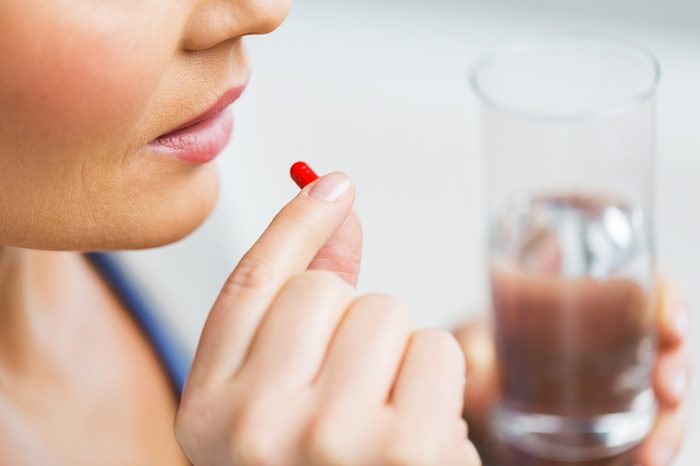
Mixing probiotics
Can you take one probiotic for digestive health and a different one for vaginal health? “Unless recommended otherwise by a healthcare professional, I would recommend staggering intake within a day,” says Anthony Thomas, PhD, director of scientific affairs at Jarrow Formulas. In other words, take one probiotic with breakfast and the other at lunchtime.
When choosing the probiotic that’s right for you, don’t be afraid to ask your health professional for advice. Or reach out directly to supplement companies and ask for the research that supports the claims for their products. The reliable manufacturers expect this.
“I would encourage consumers to request the clinical research evidence to substantiate the use of a formula or the microbes it contains,” advises Thomas. For more insider info, find out everything you’ve ever wanted to know about probiotics.
